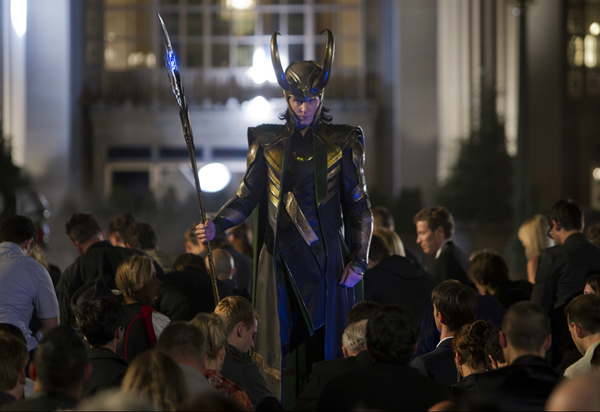

Director: Michael Sucsy, 2012. (PG-13)
There’s no such thing as a free
lunch. That’s a well-known aphorism that’s not quite true. Sometimes there are
free lunches, meals with no strings attached. Here’s another one: there are no
do-overs in life. We don’t get a mulligan on our mistakes. That’s more or less
taken as gospel truth. But in this based-on-real-life movie, even this truism
is in question.
 Channing Tatum stars as Leo, happily
married to Paige (Rachel McAdams, Midnight in Paris) and living in Chicago. He
has a recording studio, she is a budding sculptor with an impressive portfolio.
With voice-over narration, act one tells the story of their whirlwind romance
and quirky wedding. Absent are any family, present are friends only.
Channing Tatum stars as Leo, happily
married to Paige (Rachel McAdams, Midnight in Paris) and living in Chicago. He
has a recording studio, she is a budding sculptor with an impressive portfolio.
With voice-over narration, act one tells the story of their whirlwind romance
and quirky wedding. Absent are any family, present are friends only. Then there is a moment that changes everything. A snowy night, a freak car crash leaves Paige in a coma. When she awakes she has no memory of their relationship. She can recall her childhood and her family, but not Leo or their 4 years together. To make matters worse, her parents Bill (Sam Neill, Jurassic Park) and Rita (Jessica Lange) show up out of the blue to pay her medical bills and reclaim her daughter. Leo is pitted against the parents for the final two acts.
“Life’s all about moments, of impact and how they change our lives forever. But what if one day you could no longer remember any of them?” Leo’s comment centers the conflict in the movie. And it raises a question to ponder: can a person be held accountable for a vow s/he cannot remember making? Even though Paige is shown video evidence of her wedding, she cannot remember it and the groom is a stranger to her, though she is not to him.
Memories. Who are we without them? Does our identity reside in these ephemeral and intangible ideas? Certainly, the quality of our identity is enhanced by them. But our fundamental identity is defined by our soul or spirit as it relates to God, our creator. We will one day be made whole, and presumably will have our memories restored. So memory cannot be the ultimate arbiter of identity.
So let’s move on from memories to oaths. How permanent is a vow? In the Old Testament, Moses gave us this view of a vow: “When a man makes a vow to the LORD or takes an oath to obligate himself by a pledge, he must not break his word but must do everything he said” (Num. 30:2). Of course, this is a vow to the Lord, but marriage is a commitment before God and so should bear the same weight. Indeed, a vow is a solemn promise, a pledge not just a probability. But is a vow forgotten, a vow fractured? No, absolutely not. In today’s environment of aging boomers, there are more and more people suffering from wiped memories, dementia or Alzheimers. Their vows remain even if their relationships suffer. But for many the relationship persists; it is not ruptured.
In The Vow, Leo finds himself pushed to the sidelines as Paige’s lack of memory makes him an outsider to her. Her family does not accept him. Her father offers him a deal with the devil to move on, to let her go. It is clear that he loves her, but desires her true happiness.
Their vows are non-traditional. Theirs is a modern marriage. But does he fulfill his vow? And does she? As the movie progresses, Leo’s frustrations and temptations increase. Yet so do Paige’s. Both are victims, but she perhaps more than he. With Leo being given center stage, the movie falters a little, since we don’t get to experience the perspective of the person who has lost the remembrances.
For such a great concept, the film is lacking true depth. It does not explore the ramifications nearly enough. Rather, it sets up obvious situations and plays them out fairly predictably. And the acting is no more than solid. No one really stands out here.
But as mentioned this is more than a concept. It really happened. Kim and Krickitt Carpenter were in an automobile accident in the 1990s that left her (Krickitt) with no memory of her 18 month long marriage. Like Paige, she woke up to a man she did not know claiming to be her husband. But unlike in the film, the Carpenters had a strong Christian faith, and they drew strength from the Lord to rebuild a relationship together. Today, they are married with two children, but Krickitt still has no recollection of the 18 months prior to the car crash. In their book, “The Vow”, Kim says, “This story is not about me. It’s about the Lord and how He brought my wife and me through a terrible time to a life that is greater than we could have ever imagined. It’s about a commitment to the Lord and to each other.” This is a marvelous example of the truth of Rom. 8:28.
The Vow, in the truest sense of the underlying book, is about a commitment to God that precedes a commitment to another. But that vow to God undergirds and provides the foundation for the vow to the spouse. Should a vow be permanent? Yes. Can it be? Absolutely, especially if it is centered in God above all.
Copyright©2012, Martin Baggs






























-picture-MOV_29ae48c5_b.jpg)



